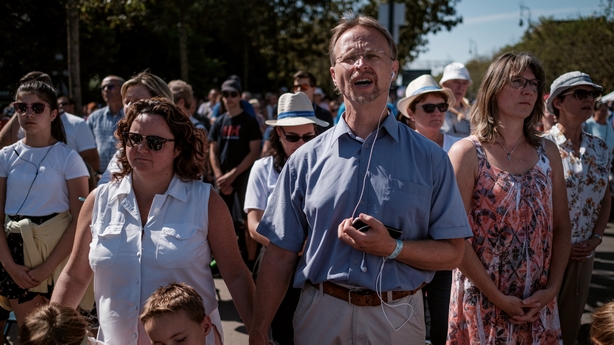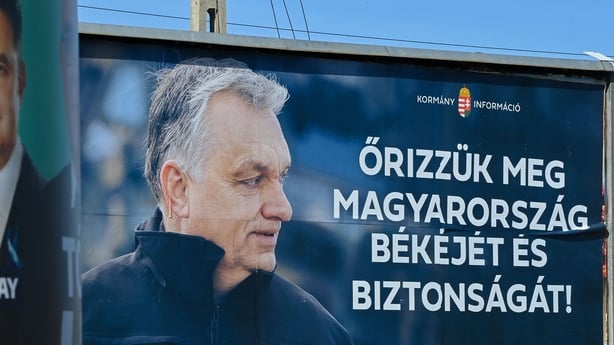Pope Francis during the first speech of his visit to Hungary has called for recovery of the European spirit and rejection of "adolescent belligerence" amid rising nationalism and war in Ukraine.
It is the first event during his three-day visit to the country, where he will meet with the country's Prime Minister, Viktor Orbán, to discuss the war in Ukraine and migration.
During his visit, the pontiff will meet with children with disabilities, refugees and people living in poverty.
"It is vital, then, to recover the European spirit: the excitement and vision of its founders... and to generate forms of diplomacy capable of pursuing unity, not aggravating divisions," the pope said.
He also called for "creative efforts for peace" to stop the war in Ukraine.
About one in three Hungarians are Catholic so the Pope’s visit to the central European country is not an entirely obvious one.
The number of Hungarians identifying as Catholic fell dramatically in the two decades following the end of Communist rule.
Pope Francis spent seven brief hours on Hungarian soil in 2021 and, at the time, promised to return.
Gabor Gyori, a Hungarian political analyst, told RTÉ News that the media impact of the papal visit will "reach far beyond practising Catholics" because many Hungarian families still identify with the "cultural framework" of the Catholic Church.
"The government will probably try to frame the Pope's as an endorsement of Hungary's pro-peace stance," said Mr Gyori, senior analyst at Policy Solutions, a political research institute in Budapest.
Mr Orbán has said that Hungary and the Vatican are the only two "pro-peace" states in Europe when it comes to the war in Ukraine.
Hungary, a NATO member, is an outlier on the war.
Mr Orbán condemned Russia’s invasion in February 2022, but unlike NATO’s other eastern members, Budapest does not support arming Ukraine, nor does it allow weapons to be transported to Kyiv via its territory.
Hungary’s prime minister, who comes from a Calvinist background, and many of his senior cabinet ministers, have repeatedly called for peace in Ukraine, mostly on social media.
However, details of the Hungarian plan for peace remain scant.

In a statement published on a Hungarian government website last month, Mr Orbán criticised Hungary's NATO allies for "placing ever more brutal equipment at the disposal of the Ukrainians".
"The whole peace rhetoric is distorted," said Mr Gyori, referring to the Hungarian government's stance on the war.
"Their argument is that there should be negotiations and the implicit assumption is that Hungary's government is effectively endorsing territorial concessions from Ukraine".
The Pope has repeatedly called for both Russia and Ukraine to stop fighting and last August he described Russia's invasion as "repugnant", as reported by Associated Press.
Speaking on Vatican Radio this week, the Apostolic Nuncio to Hungary, Archbishop Michael Wallace Banach said the Pope’s visit will be a "moment of recognition" for the help provided by the Catholic Church in Hungary to Ukrainian refugees.
Hungary’s right-wing government holds a traditional view of the family and in 2021 introduced a legislation to prohibit the promotion of homosexuality and gender change in content taught in schools to minors.
This has brought Mr Orbán's government into conflict with the European Commission which has launched an infringement case against Budapest.
Traditional views of the family chime with those of the Roman Catholic Church, but Pope Francis has promoted acceptance towards gay people since the start of his pontificate.
Hungary's prime minister and the Pope have little in common when it comes to refugee policy.
During Europe's migrant crisis of 2015, Pope Francis urged Europe's Catholics to host refugees.

At the time, Mr Orbán became one of Europe's most outspoken anti-immigration voices.
In an opinion piece for German newspaper Frankfurter Allgemeine Zeitung in September 2015, Mr Orbán called the EU's immigration policy "misguided" and that Muslim refugees arriving in Europe represented a "radically different culture".
Three years later, Mr Orban told another German newspaper, Bild, that Germany "wanted the migrants, and we didn't".
Yesterday, the Pope held talks with Ukraine’s Prime Minister Denys Shmyhal in the Vatican City.
Mr Shmyhal told reporters he had invited the Pope to visit Ukraine and had asked for help in repatriating thousands of Ukrainian children taken to Russia since the start of the war.
Ukraine’s prime minister also said that he and the Pope had discussed Kyiv’s peace plan to bring about an end to the war.
The Vatican, or the Holy See, to go by its official name, is the world’s smallest state. It measures less than half a square kilometre but has held permanent observer status at the United Nations since 1964.
This means its representatives, or nuncios, can attend sessions at the UN General Assembly, giving it a surprisingly unique, if not oversized role, in global diplomacy.
Pope Francis, who was treated in hospital for bronchitis last month, has said that he would like to visit both Kyiv and Moscow on a peace mission.
Additional reporting Reuters/AFP






